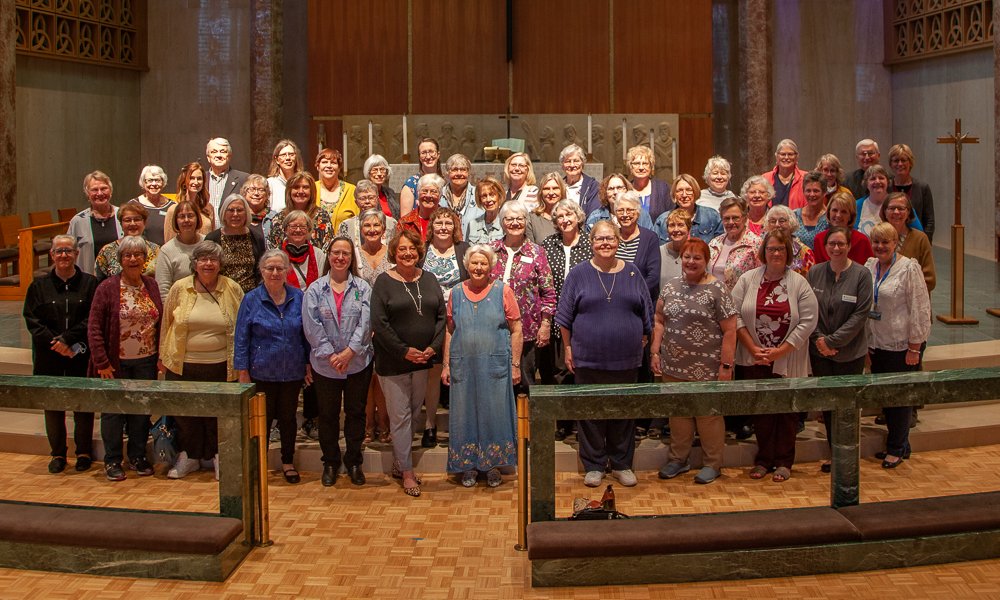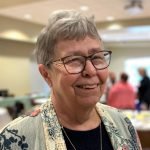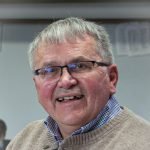
Concordia University Wisconsin hosts its 30th Annual Parish Nurse and Congregational Health Ministries Conference.
A lot has changed in the last 30 years of healthcare. We’ve seen huge advancements in medical technology, breakthroughs in pharmaceutical care, and new ways of treating people only imagined three decades ago. We’ve seen ethical debates flare up and cool down, we’ve endured (and are still dealing with) global pandemics, and dealt with rising costs and government-funded care. And that’s only scratching the surface!
But one thing that’s remained a constant during those 30 years is that the parish nurses of the LCMS and others involved in congregational health ministry gather at Concordia University Wisconsin. The 30th annual conference, held last week, drew more than 80 participants from 15 states, which represents a return to pre-pandemic numbers. For two days, nurses, pastors, and lay ministers from across the country loved and supported one another, shared experiences and knowledge, discussed the future of their calling, and gave the glory to God.
“I couldn’t be any happier that God has blessed us with another successful conference,” said Dr. Carol Lueders Bolwerk, professor of nursing and director of parish nursing at CUW.
For the glory of God
The concept of a parish nurse was born in the mid-1980s when Granger E. Westberg, a Lutheran pastor and professor best known writing Good Grief, a best-selling book on grieving, started a program at Lutheran General Hospital in Park Ridge, Illinois. His passion for enlisting nurses to impart spiritual care into their caregiving has since grown into a broader concept called “faith community nursing.”

“It all falls under the umbrella of ‘community health ministry,’” Lueders Bolwerk says, “which includes things like public health nursing, school nursing, parish nursing, etc. It’s a wonderful ministry.”
In addition to providing spiritual care, one role of a parish nurse (which is typically a volunteer position in a church) to provide a bridge to what can sometimes be an intimidating and/or expensive trip to the doctor. People often consult their parish nurse, for instance, when they’re “just a little bit sick,” explained Rev. Dr. David Zersen, President Emeritus, Concordia University Texas, who gave a presentation called “Parish Nursing Explores its Lutheran Heritage.”
The conference explored a wide range of topics and issues, with breakout sessions that covered everything from “Theology of Mercy” and “The Joy of Compassionate Presence” to “Human and Sex Trafficking: Education is Prevention and Detection” and “Elder Care Concerns: Social Isolation Effects from COVID, Dementia and Mental Health Issues.”

Along with Dr. Lueders Bolwerk and Zersen, two other key players are Dr. Jamie Spikes and Dr. Marcy Schnorr. Both have been involved with the conference from the very beginning.
Schnorr, who is an active parish nurse in Rochelle, Illinois, is also chairperson for Lutheran Parish Nurses International, serves as a member of the Leadership Council for the LCMS, and led the panel discussion that opened the conference on Wednesday.
“I’m passionate about parish nursing because it allows me to use my faith and my professional gifts together, and to serve Him and give Him glory,” she explains. “I like this conference because—there are a number of meetings for parish nurses, but some of them are more secular. And if we leave out the Christ-centered nature of it, we leave out the most important part!”

Spikes, from Manhattan, Kansas, says that the world needs parish nursing, especially today, “because it needs Christ.” As for the conference, she loves how it brings together so many compassionate people to learn from one another.
“We all share the same kind of goals and aspirations, and programs,” she explains. “We share materials that we’ve developed and shared with others, that we’ve tailored to our churches, that you wouldn’t find online or anywhere else.”
Their common experiences also lead to a lively exchange of stories.
“My whole presentation is on stories that I’ve gathered over my time as a parish nurse,” Spikes says. “This is an intimate group. Even though I wasn’t here last year, I got emails, and I got text messages, saying ‘we really miss you,’ that kind of thing. It’s kind of a sorority, and we’re all just really close together.”
RELATED: Celebrating four decades of faith-based nursing education
The healing hands of Jesus
Putting some extra emphasis on the spiritual side of things was Rev. Dr. Dan Paavola, CUW professor of theology, who has been involved with the conference for 20-plus years. Paavola spoke at Chapel on Wednesday morning and followed that with a presentation on Jesus’ parable of the Good Samaritan.

Needless to say, he’s a big fan of parish nursing.
“If a congregation is fortunate enough to have one of these wonderful women, they make a bridge between saying you care for you members and connecting them with resources that aren’t always easy to access,” Paavola explains. “They might be afraid to go into that enormous hospital or the clinic, but they can talk to Karen [for example] or to Rhonda, who they see every Sunday. She may not have all the answers, but she can help them make a connection, or whatever’s needed as a next step.
“I think it’s that accessibility and trust that congregations can have by being able to say, ‘This is our nurse.’”
In addition to the Wednesday-Thursday conference, the event was preceded by a Tuesday meeting of the parish nurse district representatives. Lueders Bolwerk, who represents the South Wisconsin district, says she’s very grateful for all the support the conference gets from Concordia. It’s a true team effort, she says, requiring efforts from campus ministry, the IT department, campus safety, food service, maintenance, housekeeping, advancement, you name it.
“You can’t have a conference like this and be successful without a lot of people,” she explains. “It’s a lot of hard work, and takes a lot of time. So we are very blessed to have such support and such a successful event, which is a good mission fit for CUW.
“We had excellent speakers who really looked at our past, our present, and our future vision, and who did a wonderful job in sharing the word of God and underscoring the healing ministry of Christ.”
For more information on nursing programs at Concordia University of Wisconsin, visit the School of Nursing at cuw.edu.
— This story is written by Mike Zimmerman, videographer/photographer for Concordia University Wisconsin. He may be reached at michael.zimmerman@cuw.edu or 262-243-4380.
If this story has inspired you, why not explore how you can help further Concordia's mission through giving.